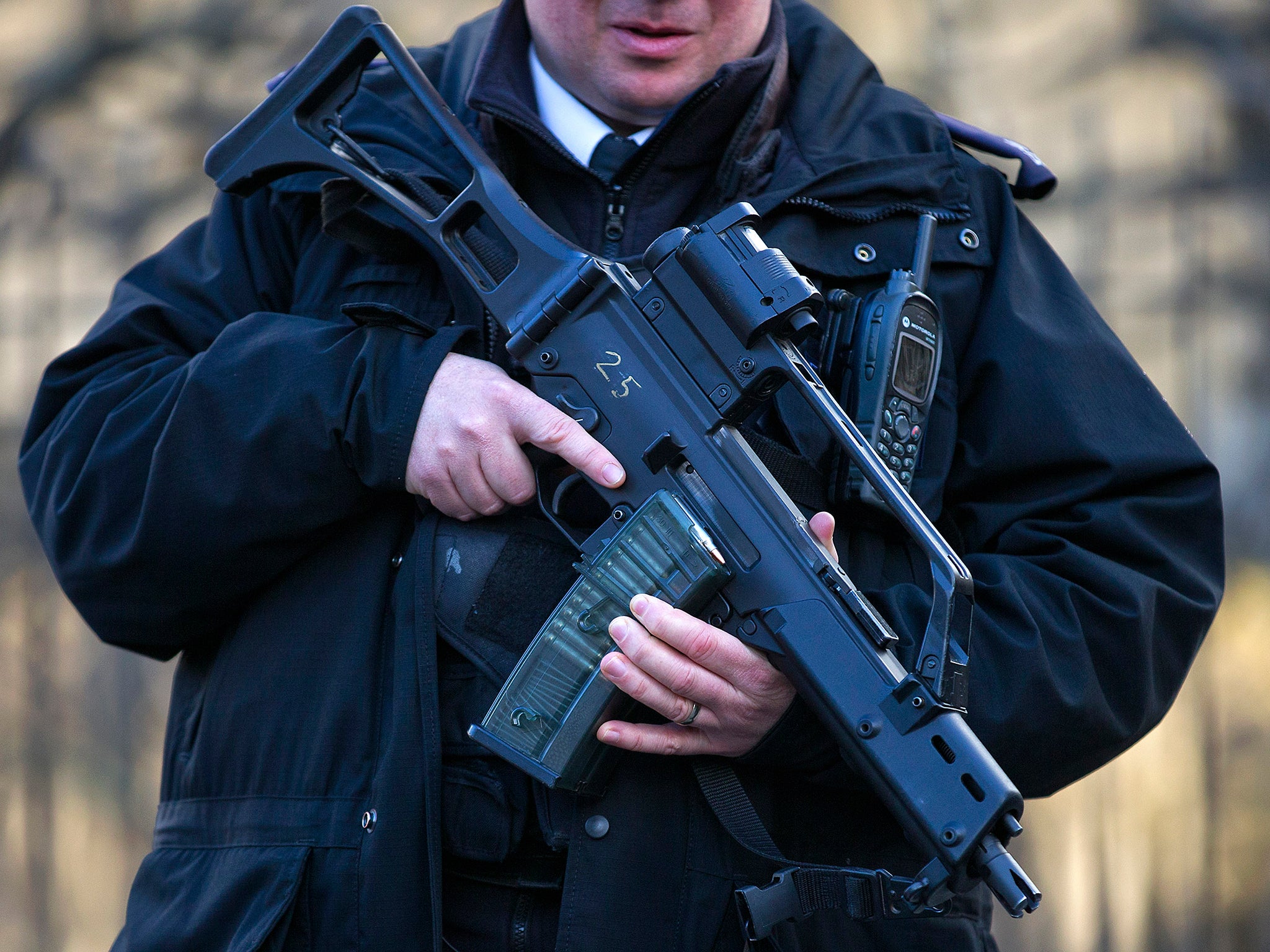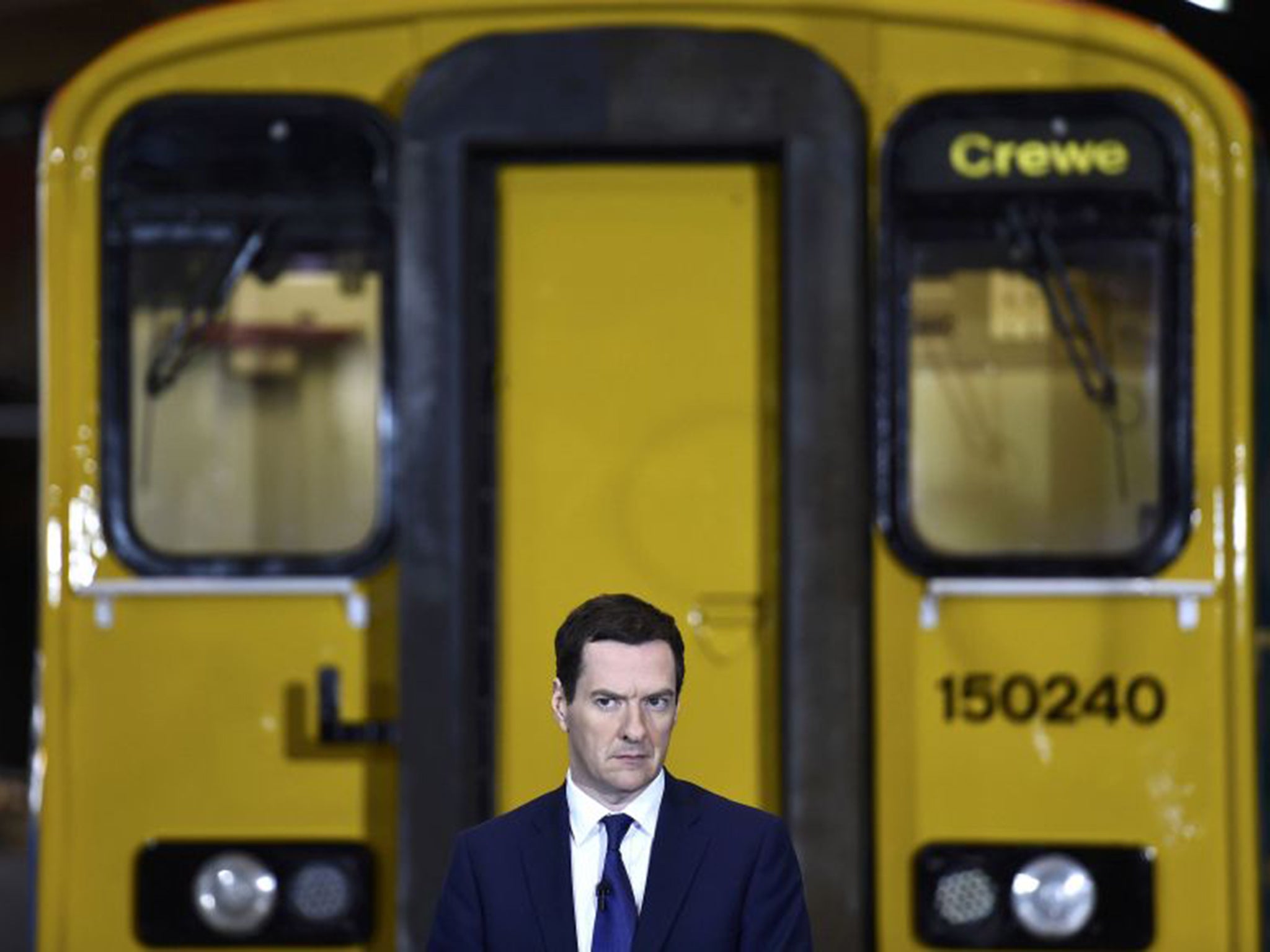George Osborne 'risking national security by failing to guarantee Transport, Military and Civil Nuclear Police will be saved from cuts'
Terrorism fears as Chancellor’s pledge excludes forces which protect railways and military bases

Your support helps us to tell the story
From reproductive rights to climate change to Big Tech, The Independent is on the ground when the story is developing. Whether it's investigating the financials of Elon Musk's pro-Trump PAC or producing our latest documentary, 'The A Word', which shines a light on the American women fighting for reproductive rights, we know how important it is to parse out the facts from the messaging.
At such a critical moment in US history, we need reporters on the ground. Your donation allows us to keep sending journalists to speak to both sides of the story.
The Independent is trusted by Americans across the entire political spectrum. And unlike many other quality news outlets, we choose not to lock Americans out of our reporting and analysis with paywalls. We believe quality journalism should be available to everyone, paid for by those who can afford it.
Your support makes all the difference.George Osborne has been accused of risking national security by failing to guarantee that the three forces which guard railways, military sites and nuclear installations from terrorist attack would be protected from spending cuts.
The Chancellor won plaudits in last month’s Autumn Statement for exempting police forces from a fresh squeeze on government budgets, promising they would receive an extra £900m over the next four years.
But the British Transport Police, which patrols railways in England, Scotland and Wales, was not covered by Mr Osborne’s pledge, it has emerged. Spending by Ministry of Defence Police, which guards military bases across the UK, and the Civil Nuclear Constabulary, which protects nuclear sites and nuclear waste when it is being transported, has also been excluded. The three forces have more than 6,000 officers between them.
The Government said it was “ridiculous” to claim it was not fully committed to keeping Britain safe and pointed to the Chancellor’s planned £500m boost for counter-terrorism. It also argued that the three forces received money from other sources such as industry.
But Labour claimed the Government’s failure to ring-fence the three forces’ budgets explicitly was “deeply alarming”. It pointed out that Britain’s last two attacks took place outside an army barracks – the murder of Fusilier Lee Rigby in Woolwich – and, more recently, at Leytonstone Tube station where a man was stabbed.
In the Autumn Statement, Mr Osborne announced the Government would “protect overall police spending in real terms” over the next four years, which he said was the equivalent of an increase of £900m in cash terms over the period. He told cheering MPs: “The police protects us, and we’re going to protect the police.”
The announcement took the Commons by surprise as he had been widely expected to order further reductions in police spending.

But Mike Penning, the Policing minister, disclosed in a Commons written answer that the commitment related to the 43 police forces in England and Wales for which the Home Office provides funding.
The shadow treasury minister, Rebecca Long-Bailey, said: “It’s fundamentally dishonest for George Osborne to claim he’s protecting police spending when his pledge does not include policing our public transport system, guarding our military or protecting nuclear installations and materials.
“This is deeply alarming given that the last two terrorist attacks in Britain were in a tube station and outside a military base, and nuclear facilities are an obvious target. He said he was protecting the police but he was really just trying to protect himself.”
Labour claimed the three forces would be dependent on other Whitehall departments – the Department for Transport, the Ministry of Defence and the Department for Energy and Climate Change – to protect their budgets. The transport and energy departments are among those which have agreed to financial squeeze, facing budget cuts respectively of 37 per cent and 16 per cent.
British Transport Police officers were among the first to respond to the attack at Leytonstone station. The previous week, the force, which has almost 3,000 officers, said it was launching extra high-profile patrols designed to “identify and deter terrorism”. It said it wanted to reassure the travelling public that it was taking measures to ensure their safety while using the rail network.
A government spokeswoman said: “It is ridiculous to suggest the government is not committed to funding the forces that keep our country safe. At the spending Review we protected overall police spending in real terms with an increase of £900m cash by 2019-20 to maintain strong frontline policing and further strengthen police firearms resource to protect UK citizens. This is on top of an extra £500m extra funding for the counter terrorism budget, to protect the UK from the ongoing threat posed by terrorism.
“Funding for other specialist police forces is not provided by a central government grant and comes from other sources, including industry. We are committed to funding our police forces across the country to protect Britain’s national security.”
The fine print of the autumn statement promise on police funding has already run into criticism from police and crime commissioners. Theresa May, the Home Secretary, has written to chief constables advising them that to receive a share of the extra £900m they will have to raise more money locally.
She said police spending would be protected over the next four years “when local income is taken into account”.
Her letter added: “Total central Government resource funding to policing, including funding for counter-terrorism, will be reduced by 1.3 per cent in real terms over four years.
“Taking into account the scope that you have to raise local council tax, this means a flat real settlement for policing as a whole.”